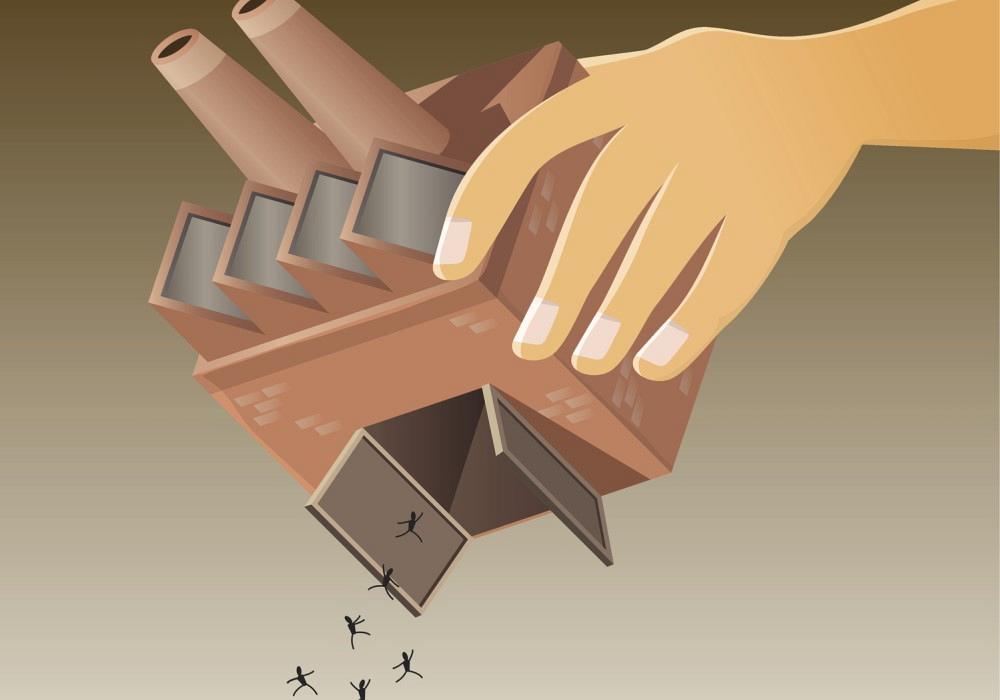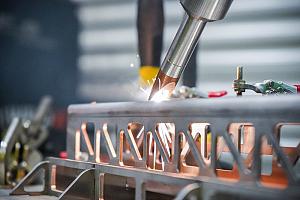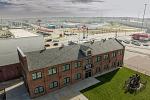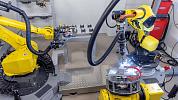Editor-in-Chief
- FMA
- The Fabricator
- FABTECH
- Canadian Metalworking
Categories
- Additive Manufacturing
- Aluminum Welding
- Arc Welding
- Assembly and Joining
- Automation and Robotics
- Bending and Forming
- Consumables
- Cutting and Weld Prep
- Electric Vehicles
- En Español
- Finishing
- Hydroforming
- Laser Cutting
- Laser Welding
- Machining
- Manufacturing Software
- Materials Handling
- Metals/Materials
- Oxyfuel Cutting
- Plasma Cutting
- Power Tools
- Punching and Other Holemaking
- Roll Forming
- Safety
- Sawing
- Shearing
- Shop Management
- Testing and Measuring
- Tube and Pipe Fabrication
- Tube and Pipe Production
- Waterjet Cutting
Industry Directory
Webcasts
Podcasts
FAB 40
Advertise
Subscribe
Account Login
Search
The link between civic viability and manufacturing industry
Manufacturers make communities stronger and offer more than just economic hope
- By Dan Davis
- June 24, 2020

When a manufacturing company leaves a town or a city, people should take note. A provider of well-paying jobs is taking hope and the potential for prosperity to another zip code. Getty Images
“They don’t care about my business,” Kris Wyrobek, president and owner of 7-Sigma Inc., told a reporter for the Minneapolis Star Tribune after his business burned to the ground in the aftermath of George Floyd protests and riots and because local firefighters failed to respond in time.
Wyrobek pledged that the company, which makes polymer and metal components for the aerospace, industrial, medical, and printing markets, wouldn’t rebuild at its current location in south Minneapolis. Prior to the riots, Wyrobek said that moving from the city was “not in my wildest nightmare.” An actual nightmare, however, changed those plans.
The entire episode is a tragedy. I wish that I could write that it was avoidable, but history has a way of repeating all too frequently when the volatile forces of civil unrest and aggressive law enforcement meet. It’s ugly. It hurts. And it seems we can expect it to happen again.
People’s indifference to human life and the businesses that take a human a lifetime to build creates a scenario where simply living life is hard to do. When a community is marked by burned-down or boarded-up businesses and temporary memorials to a murdered neighbor, residents find it hard to be optimistic about their neighborhood’s future.
We’ve seen this play out before. Manufacturing companies moving to the suburbs from urban settings or to other states where taxes are not as burdensome is nothing new. Some might equate such moves with times of civil unrest, like the days following the assassination of Martin Luther King Jr. or the Rodney King verdict, but that is only part of the story. Plenty of companies also have moved when the economy was doing well because it made good business sense for them.
The end result is hardly ever a good one, however. Manufacturing companies have been—and remain so today—great stepping stones to a better life, particularly when one is making the transition to adulthood or simply trying to reset one’s life. The steady paycheck and chance to develop skills go a long way in helping people to finally have options, instead of simply making the decision that seems to be the only one available to them.
You could argue that the same philosophy applies to other types of employers, but a small to medium-sized manufacturing company stands out because it typically can offer more well-paying and full-time jobs than a similar-sized retail store. Politicians know this. That’s why they’re always appearing at manufacturing facilities for photo opportunities. More workers translates into more possible voters, and that’s who politicians want to meet.
Don’t be mistaken. This isn’t a eulogy for the death of America’s major cities. This same situation is being played out in smaller towns all over the U.S. Actually, it’s probably a sadder situation because many of these towns die with the demise of major manufacturing employers, that have closed or relocated for a variety of economic reasons. When a factory closes in a factory town, banks, retail stores, and restaurants all feel the effects. Townsfolk can’t spend what they don’t have.
METALfx, which will be featured in the July issue of The FABRICATOR, was a well-kept secret from the residents of Willits, Calif., according to company President Henry Moss. That’s really saying something considering the town has a population of about 5,000. But like many metal fabricators, over the company’s history, METALfx just focused on making parts for its customers. The metal fabricator didn’t spend a lot of time on marketing and community relations. It was a manufacturer, not a real estate firm hoping to garner top billing among sponsors for the local chamber of commerce pancake breakfast.
That’s where Moss, who has been with the company for three years, wanted to make a change. The fab shop is one of two major employers, the other being the local hospital, in the town, and he wanted the company to be as much of a part of the community as its own employees.
“It’s impossible for me to go around town and not run into an employee,” Moss said. “So it’s more than we just work together. We live together. It really is a close-knit community.”
Next month, you can read in the story about what METALfx did for its employees and the Willits community during the COVID-19 crisis. Just know that all of the actions reinforced what a lot of people are preaching during this pandemic: “We’re all in this together.”
Obviously, Wyrobek and 7-Sigma Inc. don’t feel that way. Perhaps they can find that symbiotic existence in another town.
For the rest of us, we should probably focus on taking care of those around us and those local businesses that require our support. While we may not be able to solve the world’s problems, we can improve our local communities. Small steps forward are better than retreating from the challenges that await us.
subscribe now

The Fabricator is North America's leading magazine for the metal forming and fabricating industry. The magazine delivers the news, technical articles, and case histories that enable fabricators to do their jobs more efficiently. The Fabricator has served the industry since 1970.
start your free subscriptionAbout the Author

Dan Davis
2135 Point Blvd.
Elgin, IL 60123
815-227-8281
Dan Davis is editor-in-chief of The Fabricator, the industry's most widely circulated metal fabricating magazine, and its sister publications, The Tube & Pipe Journal and The Welder. He has been with the publications since April 2002.
- Stay connected from anywhere

Easily access valuable industry resources now with full access to the digital edition of The Fabricator.

Easily access valuable industry resources now with full access to the digital edition of The Welder.

Easily access valuable industry resources now with full access to the digital edition of The Tube and Pipe Journal.
- Podcasting
- Podcast:
- The Fabricator Podcast
- Published:
- 04/30/2024
- Running Time:
- 53:00
Seth Feldman of Iowa-based Wertzbaugher Services joins The Fabricator Podcast to offer his take as a Gen Zer...
- Industry Events
Pipe and Tube Conference
- May 21 - 22, 2024
- Omaha, NE
World-Class Roll Forming Workshop
- June 5 - 6, 2024
- Louisville, KY
Advanced Laser Application Workshop
- June 25 - 27, 2024
- Novi, MI
Precision Press Brake Certificate Course
- July 31 - August 1, 2024
- Elgin,































